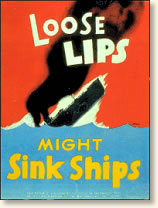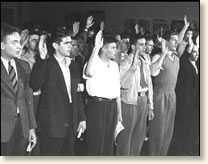WRITING HOME
THINK! Where does the enemy get his information -- information that can put you, and has put your comrades, adrift on an open sea: information that has lost battles and can lose more, unless you personally, vigilantly, perform your duty in SAFEGUARDING MILITARY INFORMATION?
THERE ARE TEN PROHIBITED SUBJECTS

1. Don't write military information of Army units -- their location, strength,,
materiel, or equipment.
2. Don't write of military installations.
3. Don't write of transportation facilities.
4. Don't write of convoys, their routes, ports (including ports of embarkation and disembarkation), time en route, naval protection, or war incidents occurring en route.
5. Don't disclose movements of ships, naval or merchant, troops, or aircraft.
6. Don't mention plans and forecasts or orders for future operations, whether known or just your guess.
7. Don't write about the effect of enemy operations.
8. Don't tell of any casualty until released by proper authority (The Adjutant General) and then only by using the full name of the casualty.
9. Don't attempt to formulate or use a code system, cipher, or shorthand, or any other means to conceal the true meaning of your letter. Violations of this regulation will result in severe punishment.
10. Don't give your location in any way except as authorized by proper authority. Be sure nothing you write about discloses a more specific location than the one authorized.
TALK

Taking the oath at a Baltimore
Induction Center, September 1942
|
SILENCE MEANS SECURITY -- If violation of protective measures is serious within written communications it is disastrous in conversations. Protect your conversation as you do your letters, and be even more careful. A harmful letter can be nullified by censorship; loose talk is direct delivery to the enemy.
If you come home during war your lips must remain sealed and your written hand
must be guided by self-imposed censorship. This takes guts. Have you got them
or do you want your buddies and your country to pay the price for your showing
off. You've faced the battle front; its little enough to ask you to face this
'home front.'
CAPTURE
Most enemy intelligence comes from prisoners. If captured, you are required
to give only three facts: YOUR NAME, YOUR GRADE, YOUR ARMY SERIAL NUMBER. Don't
talk, don't try to fake stories and use every effort to destroy all papers.
When you are going into an area where capture is possible, carry only essential
papers and plan to destroy them prior to capture if possible. Do not carry
personal letters on your person; they tell much about you, and the envelope
has on it your unit and organization.
BE SENSIBLE; USE YOUR HEAD






